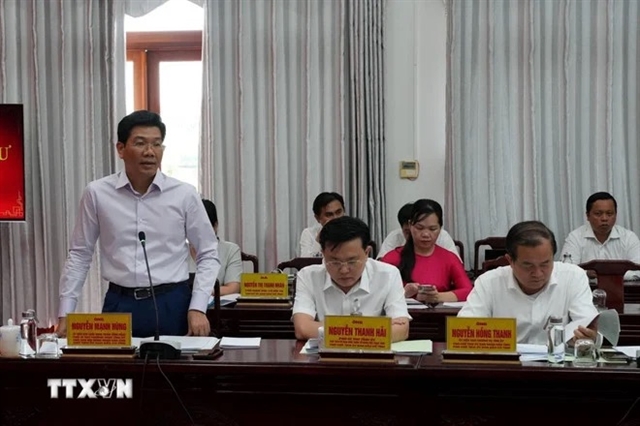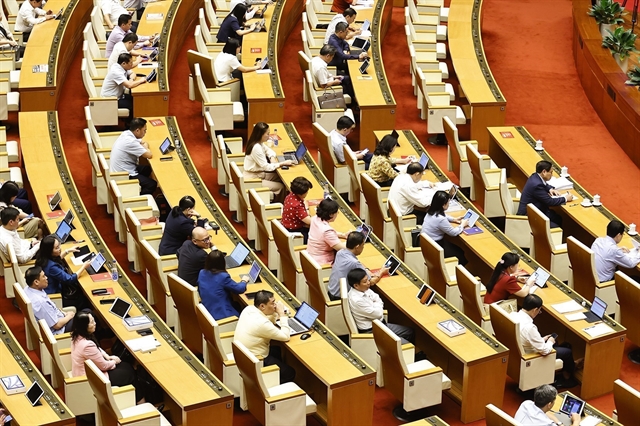 Politics & Law
Politics & Law

 |
| The National Assembly during its plenary session on Monday. — VNA/VNS Photo Doãn Tấn |
HÀ NỘI — A draft resolution to address legal bottlenecks is the centre of discussion at the 15th National Assembly (NA) during its ongoing ninth session on Monday.
The document proposes a special mechanism allowing the Government and the NA Standing Committee to issue documents to handle legal bottlenecks during the wait for formal amendments.
Speaking at the plenary, Trà Vinh Province’s deputy Thạch Phước Bình underscored that this document presents a temporary mechanism designed to flexibly respond to legal implementation challenges, in contrast to standard legislative tools.
Bình noted that this temporality must be reflected in the title of the resolution, conveying its transitional and flexible character, aligning with its scope and effective duration.
He also added that provisions on performance evaluation for the heads of ministries, sectors and localities should be added to the document to ensure efficiency in reviewing and recommending legal amendments.
The NA deputy noted that in addition to resolving legal contradictions, the resolution must also address issues in the interpretation and application of laws. The Ministry of Justice should coordinate with specialised agencies to compile such cases and issue unified legal guidelines to ensure consistency and fairness in enforcement.
The Ministry of Justice or Government Office should be required to publish a list of legal documents with bottlenecks and the proposed solutions and progress status, allowing organisations and the public to stay informed and contribute, said Bình, adding that these updates should be made available on the National Legal Portal to ensure transparency.
A notable provision is the exemption of officials from liability if they follow the correct procedures and act without self-interest, thereby easing their ‘fear of making mistakes’ that can hamper decision-making.
“I propose clarifying the conditions for liability exemption, such as requiring conclusions from inspection or audit bodies confirming no misconduct,” Bình said.
“Additionally, the role of provincial People’s Councils should be expanded to allow them to propose the amendment or repeal of outdated legal documents at the local level.”
Commenting on the draft resolution, Huế City’s deputy Nguyễn Thị Sửu said that adding the phrase “ensuring constitutional compliance and coherence of the legal system” to Article 3(1) is an appropriate and necessary adjustment to ensure quality and sustainability in lawmaking.
However, she stressed that the document should make clear provisions that enhance and protect the legitimate rights and interests of every individual and organisation, especially vulnerable groups.
She also called for administrative procedures to be simplified and made transparent so that people and businesses can clearly understand their rights and obligations, which would also prevent abuse of power and harassment stemming from vague, complex procedures.
Law-making should foster a constructive environment that not only removes barriers but also fosters innovation, fair competition and an open, equitable investment climate, she added.
Regarding legislative quality, Hà Nội’s deputy Nguyễn Anh Trí urged more practical law-making processes by increasing expert consultation from the drafting stage.
Drafting agencies should organise in-depth consultations and meetings from the early stages so that draft laws have high quality and effectiveness when presented to the NA.
Minister of Justice Nguyễn Hải Ninh expressed appreciation for the thoughtful and responsible contributions of the NA deputies.
He also clarified that while this NA resolution provides a framework for the Government to review and address legal issues that arise due to the drafting or implementation process.
Local governments have the legal authority to resolve inconsistencies within their jurisdiction, per the Law on the Promulgation of Legislative Documents.
The justice minister noted that this law, amended in 2025, includes a policy consultation mechanism to improve legislative quality.
If passed, the NA resolution to address legal bottlenecks will take effect on July 1, 2025 and remain in force until February 28, 2027. — VNS




